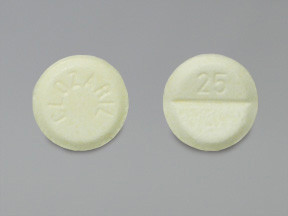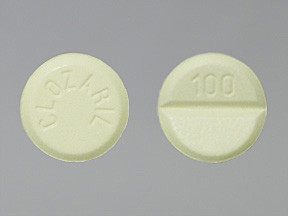CLOZAPINE - ORAL
PHONETIC PRONUNCIATION: (KLOE-za-peen)
COMMON BRAND NAME(S): Clozaril, Versacloz
GENERIC NAME(S): clozapine
Uses
USES: See also Warning section. This medication is used to treat certain mental/mood disorders (schizophrenia, schizoaffective disorders). Clozapine is a psychiatric medication (anti-psychotic type) that works by helping to restore the balance of certain natural substances (neurotransmitters) in the brain. Clozapine decreases hallucinations and helps prevent suicide in people who are likely to try to harm themselves. It helps you to think more clearly and positively about yourself, feel less nervous, and take part in everyday life.
How to use CLOZAPINE - ORAL
HOW TO USE: If you are using the liquid form of this medication, read the Patient Information Leaflet if available from your pharmacist before you start taking clozapine and each time you get a refill. If you have any questions, ask your doctor or pharmacist. Take this medication by mouth with or without food, as directed by your doctor. If you are taking the tablets that dissolve in the mouth, carefully remove each tablet from the blister pack immediately before taking your dose. Allow the tablets to dissolve on your tongue and swallow. You do not need to take the dissolving tablets with water. Discard any dissolving tablets that have been previously exposed to air due to opened/damaged packaging. Do not save them for your next dose. If you are using the liquid form of this medication, shake the bottle well for 10 seconds before each use. Carefully measure the dose using a special measuring device/spoon. Do not use a household spoon because you may not get the correct dose. It is important to begin taking this drug at a low dose, increasing your dose slowly, to lessen side effects such as dizziness, drowsiness and seizures. Follow your doctor's instructions exactly. Your dosage is based on your medical condition and response to therapy. Since clozapine can cause a decrease in white blood cells, you will need to get blood tests done regularly as directed. Be sure to keep all appointments for these laboratory tests. (See also Notes section.) If you miss your doses for longer than a day or two, consult your doctor for a new schedule to get back to the dose you were on (see Missed Dose section). Use this medication regularly in order to get the most benefit from it. To help you remember, use it at the same time(s) each day. Do not stop taking clozapine without consulting your doctor. Some conditions may become worse when the drug is suddenly stopped. Also, you may experience symptoms such as severe sweating, headache, nausea, vomiting, and diarrhea. To prevent these symptoms while you are stopping treatment with this drug, your doctor may reduce your dose gradually. Consult your doctor or pharmacist for more details. Report any new or worsening symptoms right away. It may take several weeks before the full benefit of this drug takes effect. Inform your doctor if your condition persists or worsens.
Side Effects
Precautions
Interactions
Overdose
Images
Reviews
Faq for CLOZAPINE - ORAL
Clozapine oral is used to treat severe and persistent schizophrenia in patients who have not responded to other medications.
Clozapine oral works by balancing certain natural substances in the brain, which helps to restore normal thinking and behavior.
Common side effects of Clozapine oral may include drowsiness, dizziness, excess saliva production, weight gain, constipation, and blurred vision.
Clozapine oral may start working within a few days to a few weeks, but it can take up to six weeks to see the full effects.
Clozapine oral may interact with certain medications, especially those that affect the brain, so it's important to inform your doctor about all the medications you are taking.
No, Clozapine oral is not addictive. It is not a controlled substance and does not produce a euphoric high.
Yes, there are potential serious side effects of Clozapine oral, such as decreased white blood cell count, which can increase the risk of infection. Regular blood tests are required to monitor this.
Clozapine oral should only be used during pregnancy if the potential benefits outweigh the potential risks. It is important to discuss this with your doctor if you are pregnant or planning to become pregnant.
Clozapine oral is generally not recommended for use in children. However, there may be exceptional cases where a doctor may prescribe it in certain situations.
Warning
WARNING: While clozapine can provide great benefits, it can rarely cause serious, possibly fatal side effects. For this reason, clozapine is used when other treatments have not worked or you cannot take them. For patients to receive this medication, all doctors, pharmacists, and patients must agree to, understand, and carefully follow the requirements of the Clozapine REMS Program. These requirements apply in the United States. If you live in Canada or any other country, consult your doctor and pharmacist for your country's regulations. This medication can cause a serious decrease of a certain type of white blood cells (neutropenia). To make sure you have enough white blood cells, your doctor will order lab tests before starting and while your are taking clozapine. Neutropenia may lower your ability to fight infections. Get medical help right away if you have any signs of severe neutropenia or infection (such as sore throat that doesn't go away, fever, swollen lymph nodes, unusual tiredness, weakness). Clozapine can also cause seizures, especially in higher doses. Let your doctor or pharmacist know if you have ever had seizures. While taking this medication, avoid driving or other activities during which a sudden loss of consciousness could be dangerous (e.g., operating heavy machinery, swimming). This medication may rarely cause an inflammation of the heart muscle (myocarditis) or heart failure. Get medical help right away if you develop chest pain, fast/irregular heartbeat, shortness of breath, swelling ankles/feet, unusual tiredness, or unusual/sudden weight gain. Clozapine can cause low blood pressure or a slow heartbeat, which can make you dizzy or cause you to faint when you stand up. The risk is higher when you first start or increase your dose of medication. Dizziness and lightheadedness can increase the risk of falling. Get up slowly when rising from a sitting or lying position. There may be a slightly increased risk of serious, possibly fatal side effects (such as stroke, heart failure, fast/irregular heartbeat, pneumonia) when this medication is used by older adults with dementia. This medication is not approved for the treatment of dementia-related behavior problems. Discuss the risks and benefits of this medication, as well as other effective and possibly safer treatments for dementia-related behavior problems, with the doctor.
Disclaimer
IMPORTANT: HOW TO USE THIS INFORMATION: This is a summary and does NOT have all possible information about this product. This information does not assure that this product is safe, effective, or appropriate for you. This information is not individual medical advice and does not substitute for the advice of your health care professional. Always ask your health care professional for complete information about this product and your specific health needs.




No Reviews Yet